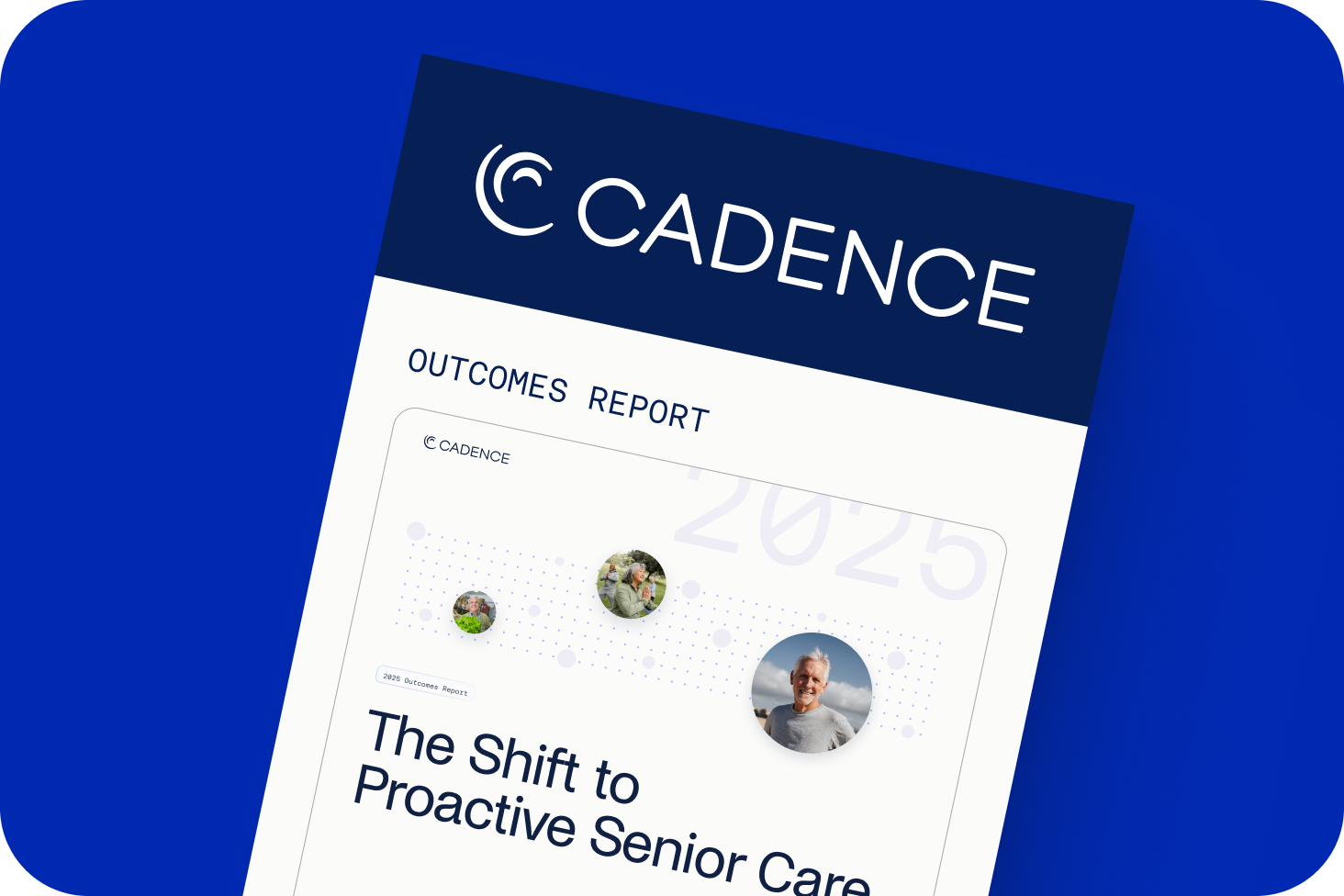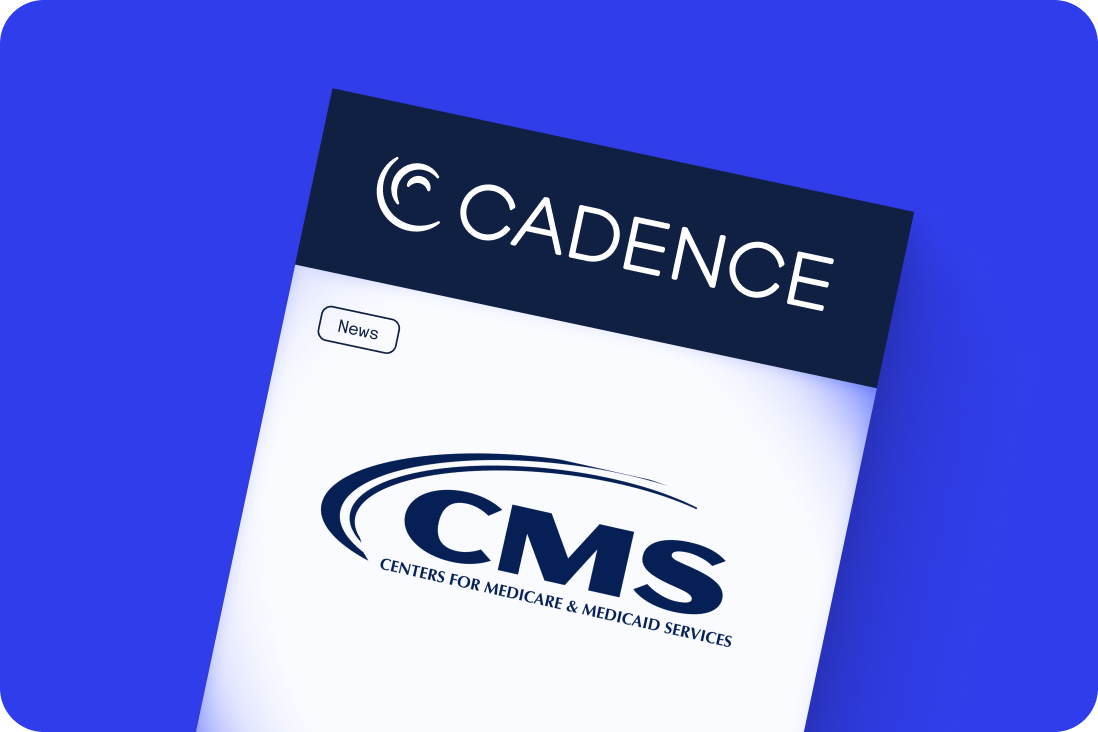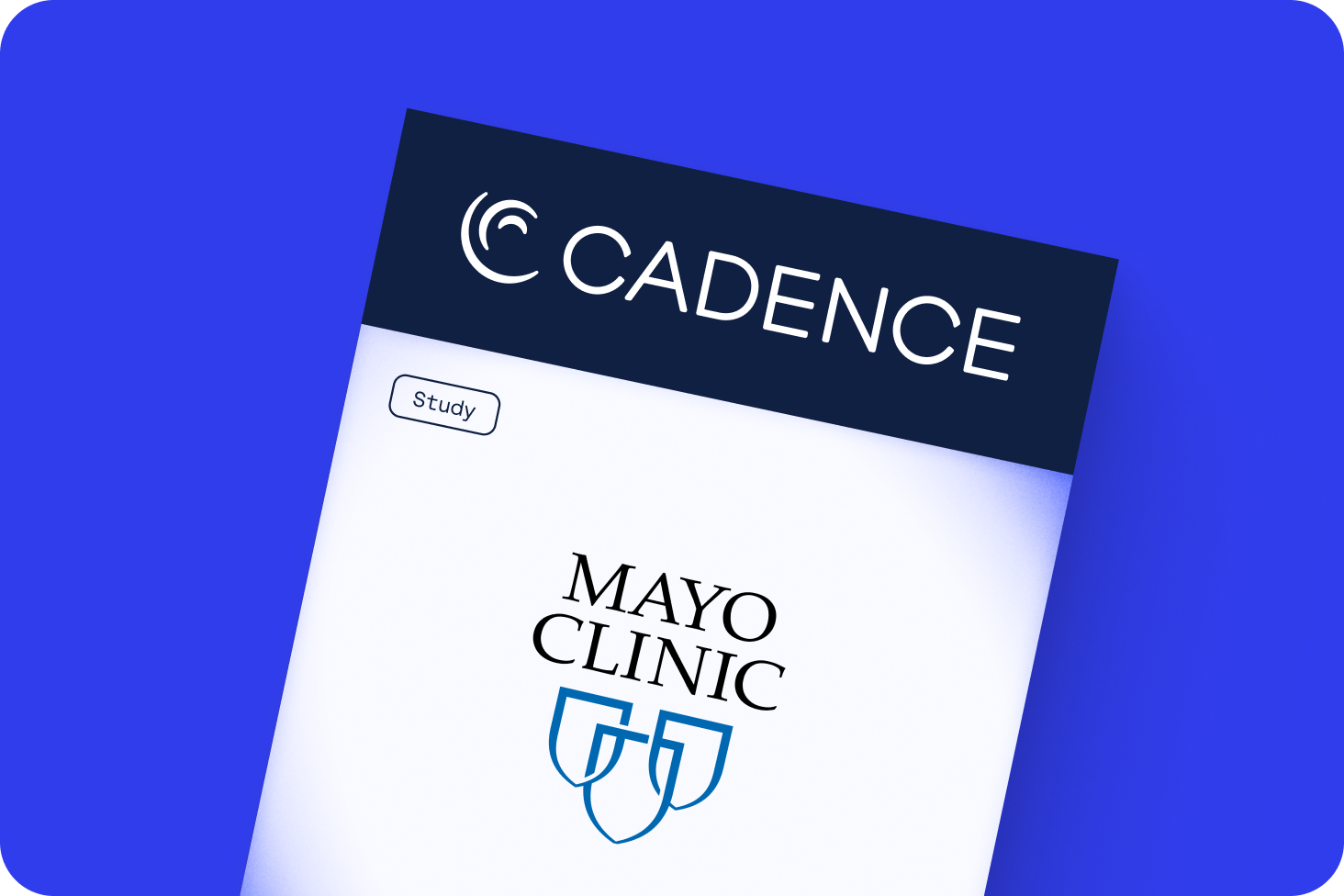Adam Boehler: How to build a great healthcare business and make an impact in healthcare

In a new episode of Cadence Conversations, CEO of Rubicon Founders Adam Boehler spoke with Cadence CEO Chris Altchek about his incredible career, including his time in public service, as well as his vision for how to achieve transformational change in healthcare through innovative technology like Remote Patient Monitoring (RPM).
The wide-ranging conversation was released as part of Cadence's new podcast Cadence Conversations, which features healthcare executives, technology leaders and policymakers discussing how technology is transforming healthcare.
In previous episodes of the podcast, Dr. Marat Fudim discussed how remote monitoring can benefit cardiologists and improve outcomes for heart failure patients, and a panel of experts including Dr. Toby Cosgrove, David Dill, Dr. David Shulkin, and Dr. Lynn Simon, discussed the future of remote patient monitoring.
Boehler, who founded Landmark Health and went on to serve as the director of the Innovation Center at the Centers For Medicare and Medicaid Services, began by discussing what drew him to healthcare and then why he decided to join the government to try to have an impact in the public sector.
"I never thought I would be in government," Boehler said. "[But] if you're in the right role and you're not afraid to do what's right, then there's nothing more significant from a platform perspective in terms of making a difference. It's sweeping."
During his time in government, Boehler helped manage the government's response to COVID-19, and also championed new payment models and helped facilitate the rise of new innovations in healthcare, including telemedicine. If there is any silver lining when it comes to COVID, Boehler noted, it's how the pandemic helped usher in a transition of care into the home outside of the four walls of the hospital.
"The idea of defining a clinical interaction based on a physical setting is an outdated idea," Boehler said. "We're behind, so let's use this opportunity to change things."
The episode concluded with Boehler and Altchek discussing RPM specifically, and what Boehler would like to see happen using technology like remote monitoring to help achieve transformational change in healthcare.
"I'm excited about the future of remote monitoring because it makes sense," he said. "This is a field where we need to stop reacting to things that happen, we need to prevent them. And we have the ability and data to do it."
"[Cadence] is right on the cutting edge there, and it's going to make a real difference for people."
Listen above to the entire conversation and be sure to subscribe to Cadence Conversations wherever you get your podcasts in order to listen to future episodes.

Read the full transcript of the conversation below:
Transcript for Episode 4: Building an impactful healthcare business with Adam Boehler
Table of Contents
- Growing up in a Household of Doctors
- Pioneering In-Home Medical Care from a Healthcare Leadership Position
- Building a Team in Healthcare Venture Capital
- Experience in a Healthcare Leadership Role for a Federal Government Agency
- The Impact of COVID on the Future of Healthcare
- Transformation of Care Delivery in the Next Decade
Introduction: Welcome to Cadence Conversations, where we're talking with prominent physicians, healthcare leaders, and tech entrepreneurs about their experiences driving innovation and progress.
This week, CEO Chris Altchek got to chat with Adam Boehler, CEO of Rubicon Founders and the former director of the Innovation Center at the Centers For Medicare and Medicaid Services. Their conversation focused on Adam's beginnings in healthcare and what drew him to public service. They also talked about Adam's return to entrepreneurship and the rewards that working in healthcare can bring. So let's get to this week's Cadence Conversations.
Chris Altchek (CA): I'm really excited to be talking to you today.
Adam Boehler (AB): Hey, thanks for having me Chris.
Growing up in a Household of Doctors
(CA): You've had an incredible career ranging from founding and operating multiple health tech companies, serving in government, and now running your own health venture firm Rubicon Founders. Can you take us back to the beginning and tell me what drew you into healthcare to begin with?
(AB): It's funny, I actually was drawn away from healthcare. I grew up in a small town outside of Albany, New York, and I watched my dad, a primary care doctor, working really late and pretty frustrated. And this is despite the fact that he's a great clinician and really loves seeing patients. And so that actually oriented me away from healthcare. And what's funny is, my wife, both of her parents are physicians and their recommendation was don't become a physician. And so when I started on the business side, I went and I worked at a venture firm focused on technology, partly because of what I saw. And later in my career, not that much longer, what brought me over, was how do we have a whole area of healthcare where parents tell their kids not to go in it, despite the fact that there's so much good you can do in healthcare? So I think in a way, it took me away, but that sat with me and is what brought me back.
Pioneering In-Home Medical Care from a Healthcare Leadership Position
(CA): Maybe we can talk about how that led you into healthcare and founding your first several companies and what brought you to Landmark specifically. You've pioneered both in-home medical care and taking risk. Can you just share a bit about that journey, the lessons you learned and what led you to be committed to continuing to build healthcare companies, despite the complexity?
(AB): One thing that's great that we do, Chris, in our business on the healthcare side is you can build phenomenal businesses, right? But you can really make a significant difference for people. And I remember I worked at a company called Medeanalytics, which was a healthcare analytics business. And I think there's a lot more young talent, a lot more innovative people in healthcare than there used to be.
A friend organized a business school class, and they came and they visited me. And it was my friend that asked me this, we were based in San Francisco, he said, "I don't understand, with Facebook and other people here, how do you get any talent to join you?" When I reflected on his question, I thought, "Well, some people want to do great things and be financially successful, but also make a really strong impact on people." And I think healthcare is really special, in that Cadence's success will mean that people live longer and it will change lives. And Facebook's success is not going to mean that. And I think that is part of what is responsible for really great talent coming into healthcare now, that are not just retreads that have been there for decades and decades, is that we have a generation of people that are graduating school now, that want more meaning in their lives. And I think that's special about healthcare.
Building a Team in Healthcare Venture Capital
(CA): And as you're recruiting and building your teams at Rubicon, you've obviously hired a bunch of incredible talent over the last two years. What do you look for in these people who might be newish to healthcare?
(AB): I look for people that want more and they want to be proud when they're older with what they did. Because I will say the great news about healthcare now, whether it's Rubicon or your firm, you've very successful businesses, so you can financially be successful. You can run with people that are talented and have an environment that is hard charging.
I do think there are easier ways to make money than healthcare, quite frankly. But if you want to look back and say, "Because I'm here on the earth, this is here because of me and it added value," then I think education and healthcare probably have the biggest impact when you're doing something. So what I look for, is I look for people that are smart, that are driven, that like to know how things work, they're not just high level people. And I look for people that want more meaning in their lives.
Experience in a Healthcare Leadership Role for a Federal Government Agency
(CA): After a super successful career founding a few companies, you decided to go join CMMI and amongst other things, pioneered very meaningful, large scale overhaul and payment models across the U.S. As you went into that decision to join government, how did you think about that being the best place to spend your next chapter? And do you encourage other entrepreneurs to go spend time in the public sector?
(AB): What's your instinct, Chris, do you think you'd work in government?
(CA): Actually, my first "job" ever was in government, so that's where I started and really enjoyed it. I did not like the campaign side but was very grateful to, in a very small way, play a part in the policy side.
(AB): The reason I asked and turned the question around on you is, I will say that I never thought I would be in government. I think I ran for treasurer in fifth grade and lost, so that was the extent of my political experience. It took a while because Patrick Conway was my predecessor at CMMI. And he called me and said, "Adam, I'm going to go be CEO of Blue Cross Blue Shield, North Carolina, would you ever consider doing this?" And my initial response was, "Absolutely not." And the reason I said it, is because I thought, "Government is the ultimate bureaucracy, it's slow, you can't impact things. And I would hate it, would be my view, because I'm an entrepreneur."
My long story short, I was convinced to do it by people like Patrick Conway, Andy Slavett was very influential, a number of people, very influential in the decision, where they said, "number one, this opportunity won't come around again, because there's not a lot of them and circumstances come together sometimes. And two, if you really believe in making a difference in healthcare..." making a difference in healthcare, like almost all things in life, is about aligning incentives. And so if we get upset and we say, "Listen, there's not enough home-based kidney care treatment" well, that's probably because of how we pay, and CMMI has the ability to change how you pay, and therefore, change healthcare.
And so I did it and my net on it, and I'll say this to anybody, and this is Democrat, Republican, any side, if you're in the right role and you're not afraid to do what's right, then there's nothing more significant from a platform perspective in terms of making a difference. It's sweeping. And the reason I say to not be afraid is that it is easier said than done, mainly because when I was in government, there was nothing that anybody complained about that I didn't do, but every single thing I did, there's always people that don't like it, every time. And you have to decide whether you listen to that or whether you just say, "that's going to happen. And I'm here for a period of time. I know my mission at CMMI, it's to lower healthcare costs, improve quality" and then just do that, despite those consequences sometimes.
Interlude: At Cadence, we have a world class care delivery team who serves as an extension of our hospital system partners and help manage patients care on a daily basis. In care delivery stories, we'll hear from one of our team members about the impact Cadence is having on their patients.
Amanda Comp: Hi, this is Amanda Comp. I'm an RN coordinator at Cadence. I had a patient with low blood pressure before taking their morning medications. Later in the day, the patient developed severe symptomatic hypotension or low blood pressure and their condition appeared to deteriorate when we spoke in the afternoon. EMS was called immediately and the patient was subsequently admitted to the hospital with COVID 19 pneumonia.
Thanks to our care delivery team and the ability to detect the patient's low vital signs early, we were able to get them to the hospital as soon as possible and prevent further injury. 11 days later, the patient was back home feeling great and thanked Cadence for helping to keep them healthy.
The Impact of COVID on the Future of Healthcare
(CA): You were at the frontlines of managing the response to COVID 19, so you talk about fear and you talk about things moving slow, this was obviously a very dynamic time. I've heard you say a bunch of times that if there was a silver lining from the past, I guess three years now, it's that we cut red tape around telemedicine, accelerated the transition of healthcare into the home, really moved both patient and physician expectations around the quality and responsiveness of the care we can deliver. Can you just talk about the lasting impact of COVID and what you'd like to see happen both on the policy side and on the broader industry side, when it comes to transitioning care into the home?
(AB): Look, I think like in anything, there's a silver lining. I was just thinking about this from a mask perspective, which is wearing masks in hospitals. Why do we always wear masks in hospitals? Think about how many hospital-acquired infections there are. I mean, it obviously took a while in our history to wash our hands, but good advent that we should probably wear masks where there's really sick people, independent of COVID, from a disease perspective. I think how we shifted testing down to the consumer was a huge value, where it used to be locked up in an office for an appointment for no good reason. Practicing across state lines and telemedicine, some of these aspects, the idea of defining a clinical interaction based on a physical setting is an outdated idea.
And again, all of the things I said have or should have bipartisan support, right? That's not a view one way or the other. This is about improving healthcare for people, which is an American value. But those things of saying, "Listen, we define care based on what happens in that interaction, not based on whether someone's in a room." Even acute care, right? You look at Hospital at Home or these kinds of things, why does something need walls to provide acute care? Acute care is acute care. All to say, care setting where it is as important, regulation and where things should look like should be independent of that. They should protect the patient at all times with the appropriate protections, but let's redefine things. We're behind, so let's use this opportunity to change things.
Transformation of Care Delivery in the Next Decade
(CA): And as you know, at Cadence, we're partnering with some of the most progressive and largest hospital systems in the country to bring remote monitoring to patients with chronic diseases all across the U.S. What gets you excited about the opportunity we have in front of us at Cadence? And how do you predict care delivery will be transformed over the next decade?
(AB): Chris, you've shown me some of your data on the outcome side and you're saving lives. You have people that otherwise would be in cardiac arrest, where you've stopped that. And that gets to what's so exciting about something like monitoring. So I think the future of remote monitoring, to be able to see someone just like you're in an ICO, an ICO is always monitoring those that are at risk. You can already see these stories. I mean, you've saved lives and I think that's what's going to be so exciting about the field.
And for Cadence being a leader in the field here, as you look to bring in talent, people will know, your team will know if they weren't around, if Cadence were not there, people wouldn't have their lives or you're buying them time with their grandchildren and that's really meaningful and that's something that you'll never forget as you build this business. So I'm excited about the future of remote monitoring, because it makes sense. This is a field where we need to stop reacting to things that happen, we need to prevent them, and we have the ability and data to do it. And so you're right on the cutting edge there. And it's going to make a real difference for people.
(CA): I appreciate that. And look, we're grateful for the opportunity to be able to serve patients and providers. And it's incredible to be able to have a small impact every day. With that, Adam, thank you so much for spending time with us. If people want to follow your work at Rubicon, how can they stay in touch on all the exciting developments?
(AB): My LinkedIn's pretty active and then the Twitter side too. So yeah, I'm just A.Boehler and you'll see me on my LinkedIn. And always write me a note, I'm just adam@rubiconfounders.com.
(CA): Awesome. Thank you, Adam. Really appreciate it.
Thanks again to Adam for sitting down with Chris this week.
To make sure you get updates on our future conversations, please subscribe to Cadence Conversations, wherever you listen to podcasts.
And for more information about Cadence and how to get involved, visit cadence.care.
At Cadence, we believe that everyone deserves to receive the best care possible, and we won't stop working until that vision becomes reality.






